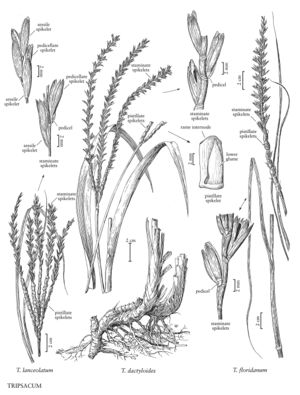Difference between revisions of "Tripsacum lanceolatum"
imported>Volume Importer |
imported>Volume Importer |
||
| Line 39: | Line 39: | ||
|publication year= | |publication year= | ||
|special status= | |special status= | ||
| − | |source xml=https:// | + | |source xml=https://bitbucket.org/aafc-mbb/fna-data-curation/src/2e0870ddd59836b60bcf96646a41e87ea5a5943a/coarse_grained_fna_xml/V25/V25_1656.xml |
|subfamily=Poaceae subfam. Panicoideae | |subfamily=Poaceae subfam. Panicoideae | ||
|tribe=Poaceae tribe Andropogoneae | |tribe=Poaceae tribe Andropogoneae | ||
Revision as of 22:04, 5 November 2020
Plants rhizomatous. Culms 1-2 m tall, 2-4 mm thick. Lower sheaths hispid; upper sheaths essentially glabrous; ligules erose, not ciliate; blades to 100 cm long, 8-30 mm wide, glabrous or slightly pubescent. Terminal inflorescences with 4-7(10) rames. Pistillate spikelets 2-3 mm wide, beadlike in appearance. Staminate spikelets in sessile-pedicellate pairs; glumes 5-10 mm long, 1.5-2 mm wide, usually membranous, acute; pedicels 2-5 mm long, less than 0.3 mm wide, almost flat to plano-convex in cross section, flexible. 2n = 72.
Discussion
Tripsacum lanceolatum grows in moist soil (often in canyon bottoms) of mountains from southeastern Arizona and southwestern New Mexico through Mexico to Guatemala. It has not been found in New Mexico since the 1800s.
Selected References
None.
